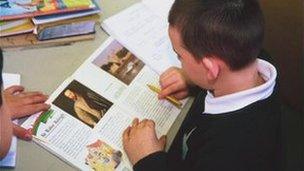Literacy progress has stalled, Ofsted's chief inspector says
- Published
- comments

Ofsted says England's pupils are falling behind other countries
England is being overtaken by other leading nations because progress on literacy has stalled, according to chief schools inspector Sir Michael Wilshaw.
Reading standards had not improved since 2005, he said, and one in five 11-year-olds did not make the grade.
In a speech, he called for primary school targets to be raised, saying: "Our standards should be higher."
Teaching unions say big improvements have been made in the past two decades.
They have accused Ofsted and the government of "playing fast and loose with international data".
Employment prospects
Sir Michael, who took over the chief inspector's role in January, told BBC Newsnight that standards in literacy and reading went up between 1995 and 2005.
But he added: "Since then, standards have stalled and other nations have been doing better than us."
Sir Michael said one in five children - about 100,000 - were not reaching the standard expected (level 4) at the end of primary school every year.
And even those who did make that grade had no guarantee of going on to get a good GCSE pass in English, he said.
In a speech in London, he said international comparisons of literacy showed "a worrying picture", and that some countries had improved faster than England - namely Japan, the Netherlands, Belgium and Norway.
The latestProgramme for International Student Assessment survey, external, in 2009, showed the UK had slipped to joint 23rd place in a global assessment of literacy, he said.
Sir Michael said the secret to boosting children's reading and writing abilities - and their overall academic performance - lay in getting things right when they were young.
"Our main concern is that too many pupils fall behind in their literacy early on. In most cases, if they can't read securely at seven they struggle to catch up as they progress through their school career," he said.
"Without reading and writing skills they find it difficult to access the curriculum and achieve well in their examinations.
"As a result, too many young adults lack the functional skills to make their way in the modern world. They are more likely to be unemployed, unwell, in prison, or supported by the state."
Reading age
Sir Michael has set out a plan to raise national standards in literacy in England.
Addressing leading head teachers and literacy experts, he questioned whether the present target for 11-year-olds was challenging enough to help prepare them for secondary school.
He also said parents should be told their child's reading age as well as how they were doing against national targets.
Ofsted, he said, would focus "more sharply" on literacy in its inspections, and on phonics training for new teachers.
The government believes a stronger emphasis on phonics will improve literacy levels.
This is a method of teaching children to read by teaching them the sounds of letters and groups of letters.
Chris Keates, the general secretary of the NASUWT teaching union, said "the critical importance of pupils' educational achievement" was "beyond dispute".
But she said the proportion of children achieving the expected level at age 11 and at GCSE level had risen since the mid-1990s.
"Ofsted is right to monitor provision in this vital subject," she said.
"However, it is essential that it does so on an evidence basis, rather than picking and choosing information that seems to support a predetermined view."
Mary Bousted, from the Association of Teachers and Lecturers, said national tests were narrowing the curriculum.
"It may well be one of the major causes why children at primary school who've had an overemphasis on test items can't access the secondary curriculum."
- Published26 January 2012
- Published3 February 2012
- Published14 November 2010